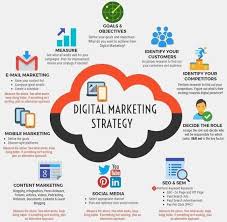The Success Story of Nike’s Digital Marketing Strategy
Nike, the global sportswear giant, has long been admired for its innovative and impactful marketing campaigns. In today’s digital age, Nike continues to set the bar high with its cutting-edge digital marketing strategy that resonates with audiences worldwide.
Embracing Technology
Nike has fully embraced technology to connect with consumers in meaningful ways. From interactive websites to engaging mobile apps, Nike leverages digital platforms to create immersive brand experiences. The Nike Training Club app, for example, provides users with personalized workout routines and training tips, reinforcing the brand’s commitment to fitness and well-being.
Social Media Savvy
With millions of followers across various social media channels, Nike excels at leveraging social media to engage with its audience. The brand’s presence on platforms like Instagram, Twitter, and Facebook allows it to share inspiring stories, showcase new products, and interact with fans in real time. By fostering a sense of community and belonging, Nike builds strong relationships with its customers through social media.
Content is King
Nike understands the power of compelling content in capturing consumer attention. Through captivating videos, inspiring imagery, and thought-provoking storytelling, Nike creates content that not only promotes its products but also resonates with its audience on a deeper level. Whether it’s featuring top athletes or highlighting social causes, Nike’s content reflects its values and connects with consumers on an emotional level.
Data-Driven Decision Making
Nike harnesses the power of data to make informed marketing decisions. By analysing consumer behaviour and preferences, Nike can tailor its digital marketing efforts to reach the right audience at the right time. This data-driven approach allows Nike to optimise its campaigns for maximum impact and ROI.
Looking Ahead
As technology continues to evolve rapidly, Nike remains at the forefront of digital innovation in the marketing space. By staying agile, creative, and customer-focused, Nike ensures that its digital marketing strategy remains relevant and effective in an ever-changing landscape.
In conclusion, Nike’s digital marketing strategy serves as a prime example of how a brand can leverage technology and creativity to connect with consumers on a global scale. Through innovative campaigns, engaging content, and data-driven insights, Nike continues to inspire and empower athletes around the world.
8 Strategic Tips for Enhancing Nike’s Digital Marketing Success
- Leverage social media platforms to engage with customers and build brand loyalty.
- Create interactive and engaging content to attract and retain online audiences.
- Utilize influencer partnerships to reach a wider audience and increase brand visibility.
- Implement targeted advertising campaigns to drive traffic to the website and increase sales.
- Optimize the website for mobile devices to enhance user experience and accessibility.
- Personalize marketing messages based on customer preferences and behaviour for better engagement.
- Use data analytics to track performance metrics and make informed decisions for future campaigns.
- Offer exclusive online promotions or discounts to encourage online purchases.
Leverage social media platforms to engage with customers and build brand loyalty.
Nike’s digital marketing strategy excels in leveraging social media platforms to engage with customers and foster brand loyalty. By actively interacting with their audience on platforms like Instagram, Twitter, and Facebook, Nike creates a sense of community and connection that goes beyond just promoting products. Through engaging content, real-time responses, and behind-the-scenes glimpses, Nike builds strong relationships with its customers, ultimately strengthening brand loyalty and establishing itself as a trusted and relatable presence in the digital space.
Create interactive and engaging content to attract and retain online audiences.
To enhance its digital marketing strategy, Nike focuses on creating interactive and engaging content that captivates online audiences. By developing immersive experiences and compelling storytelling, Nike not only attracts new customers but also retains their interest over time. Through interactive elements such as quizzes, virtual try-ons, and behind-the-scenes footage, Nike successfully connects with consumers on a deeper level, fostering brand loyalty and driving engagement across its digital platforms. This emphasis on interactive content plays a pivotal role in strengthening Nike’s online presence and building lasting relationships with its audience.
Utilize influencer partnerships to reach a wider audience and increase brand visibility.
Nike’s digital marketing strategy includes leveraging influencer partnerships to extend its reach and enhance brand visibility. By collaborating with influencers who resonate with their target audience, Nike can tap into new markets and connect with consumers in a more authentic and engaging way. These partnerships not only help Nike reach a wider audience but also allow the brand to leverage the credibility and influence of these individuals to strengthen its connection with consumers. Through strategic influencer collaborations, Nike is able to amplify its message and solidify its position as a leader in the sportswear industry.
Implement targeted advertising campaigns to drive traffic to the website and increase sales.
By implementing targeted advertising campaigns as part of its digital marketing strategy, Nike strategically directs its messaging to specific audience segments, driving traffic to its website and ultimately boosting sales. By leveraging data analytics and consumer insights, Nike can tailor its advertisements to reach the right audience with the right message at the right time. This approach not only increases brand visibility but also enhances the overall effectiveness of Nike’s marketing efforts, resulting in a higher return on investment and a more engaging online experience for consumers.
Optimize the website for mobile devices to enhance user experience and accessibility.
To enhance user experience and accessibility, Nike’s digital marketing strategy includes optimising their website for mobile devices. By ensuring that the website is responsive and user-friendly on smartphones and tablets, Nike makes it easier for customers to browse products, access information, and make purchases on the go. This mobile optimisation not only improves the overall user experience but also reflects Nike’s commitment to meeting the evolving needs of consumers in today’s mobile-centric world.
Personalize marketing messages based on customer preferences and behaviour for better engagement.
In the realm of Nike’s digital marketing strategy, a key tip for enhancing customer engagement is to personalise marketing messages according to individual preferences and behaviours. By tailoring content to align with the specific interests and actions of customers, Nike can create more meaningful connections with its audience. This personalised approach not only fosters a sense of relevance and value but also demonstrates a deeper understanding of each customer’s needs and desires, ultimately leading to higher levels of engagement and brand loyalty.
Use data analytics to track performance metrics and make informed decisions for future campaigns.
Utilising data analytics is a key component of Nike’s digital marketing strategy, enabling the brand to track performance metrics and derive valuable insights for enhancing future campaigns. By analysing data on consumer engagement, website traffic, social media interactions, and other relevant metrics, Nike can make informed decisions that drive the success of its digital marketing initiatives. This data-driven approach allows Nike to continuously refine its strategies, target the right audience effectively, and optimise campaign performance for maximum impact and return on investment.
Offer exclusive online promotions or discounts to encourage online purchases.
To enhance its digital marketing strategy, Nike can offer exclusive online promotions or discounts to incentivise online purchases. By providing special deals that are only available through their digital channels, Nike can encourage customers to make purchases online, driving traffic to their website and boosting online sales. These exclusive promotions not only create a sense of urgency and exclusivity but also reward loyal customers for engaging with the brand digitally. Nike’s ability to leverage online promotions effectively can help solidify its position as a leader in the digital marketing space while providing added value to its customer base.







